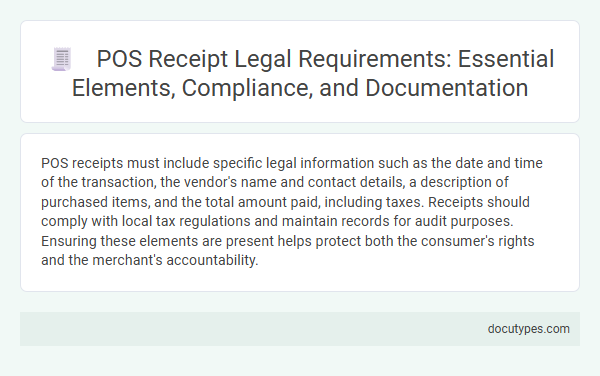POS receipts must include specific legal information such as the date and time of the transaction, the vendor's name and contact details, a description of purchased items, and the total amount paid, including taxes. Receipts should comply with local tax regulations and maintain records for audit purposes. Ensuring these elements are present helps protect both the consumer's rights and the merchant's accountability.
Introduction to POS Receipt Legal Requirements
Point of Sale (POS) receipts serve as crucial legal documents that validate a commercial transaction between a business and a customer. Understanding the legal requirements for POS receipts ensures compliance with financial and tax regulations in your jurisdiction.
Receipts must include specific information such as the date of the transaction, the seller's identification, a detailed list of purchased items, and the total amount paid. Ensuring your POS receipts meet these criteria helps protect your business from legal disputes and supports accurate tax reporting.
Essential Elements of a Legally Compliant POS Receipt
A legally compliant POS receipt must include specific details to ensure transparency and meet regulatory standards. Your receipt serves as proof of purchase and may be required for returns or audits.
- Business Information - The receipt must display the company name, address, and contact details clearly.
- Transaction Date and Time - Accurate timestamping is essential to validate when the sale occurred.
- Itemized List of Purchases - Each product or service should be listed with quantities and prices for clarity.
Including all essential elements on your POS receipt safeguards both your rights and consumer protection laws.
Mandatory Information to Include on Receipts
Legal requirements for POS receipts vary by jurisdiction but share core mandatory information to ensure transparency and validity. Including all required details on receipts protects both the business and the consumer in financial transactions.
- Business Information - Receipts must display the name, address, and contact details of the issuing business to verify the source of the transaction.
- Date and Time of Transaction - Accurate recording of the date and time ensures proof of purchase and supports any necessary transaction tracking or disputes.
- Itemized Purchase Details - Clear listings of purchased items, quantities, and prices are necessary to provide transparency and confirm transaction contents.
Industry-Specific Receipt Documentation Standards
Legal requirements for a POS receipt vary by industry but generally include essential transaction details such as date, time, item descriptions, prices, and payment method. Specific sectors like retail, hospitality, and healthcare may have additional documentation standards to ensure compliance and transparency.
You must ensure your POS receipts meet industry-specific standards, including itemized listings and tax information in retail or detailed service descriptions in hospitality. Healthcare receipts often require patient information and service codes for insurance purposes. Proper documentation helps prevent disputes, supports audits, and maintains regulatory compliance across industries.
Legal Implications of Incomplete Receipts
POS receipts must include essential information such as the date, time, itemized list of purchased goods or services, total amount paid, and the merchant's identification details to comply with legal standards. Incomplete receipts, missing any of these critical elements, can lead to disputes, difficulty in returns or warranty claims, and may violate consumer protection laws. You should ensure your receipts are accurate and comprehensive to avoid legal complications and maintain trust with customers.
Recordkeeping and Retention for POS Receipts
What are the legal requirements for recordkeeping and retention of POS receipts? Businesses must retain POS receipts for a specified period, often ranging from three to seven years, depending on local tax laws and regulations. Proper recordkeeping ensures accurate tax reporting and helps resolve any future disputes or audits effectively.
Electronic vs. Paper Receipts: Compliance Considerations
Legal requirements for a POS receipt vary depending on jurisdiction but generally mandate clear transaction details, including date, time, amount, and merchant information. Electronic receipts must comply with data protection laws, ensuring secure storage and accessibility, while paper receipts require physical durability and legibility for legal and tax purposes. Understanding the compliance considerations between electronic and paper receipts helps you maintain accurate records and meet regulatory standards effectively.
Common Compliance Mistakes in Receipt Issuance
Point of Sale (POS) receipts must meet specific legal requirements to ensure transparency and consumer protection. Many businesses unintentionally commit compliance errors during receipt issuance, risking penalties.
- Omitting Mandatory Information - Failing to include essential details like date, transaction amount, and business identification violates legal standards.
- Using Inaccurate or Illegible Data - Providing unclear or incorrect transaction information can lead to disputes and regulatory scrutiny.
- Not Issuing Receipts for All Transactions - Skipping receipt issuance for cash or small purchases breaches tax and consumer protection laws.
Regulatory Penalties for Receipt Non-Compliance
| Legal Requirement | Description | Regulatory Penalties for Non-Compliance |
|---|---|---|
| Mandatory Information | POS receipts must include the date, transaction amount, business name, and tax identification number. | Failure to include accurate details can lead to fines ranging from $500 to $5,000 depending on jurisdiction. |
| Tax Compliance | Receipts must clearly show applicable taxes such as sales tax or VAT. | Non-compliance can result in tax audits, penalties, and additional tax assessments. |
| Receipt Issuance | You are required to provide a receipt for every transaction, either printed or digital. | Omitting receipts can cause customer disputes and attract regulatory fines. |
| Record Keeping | Businesses must retain transaction receipts for a specified period, often 3 to 7 years. | Failure to maintain records can lead to legal actions and higher penalties during audits. |
| Data Security Standards | Customer data on receipts must comply with privacy laws, avoiding sensitive information exposure. | Violations can incur heavy fines and reputational damage under data protection regulations. |
What Are the Legal Requirements for a POS Receipt? Infographic

